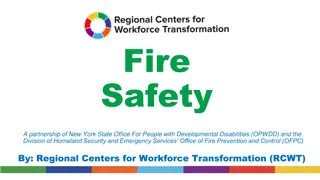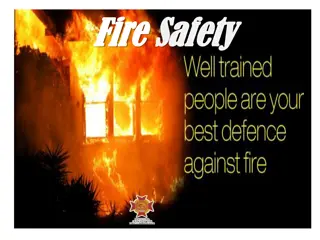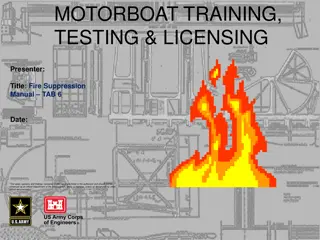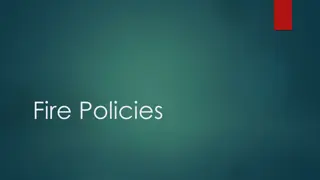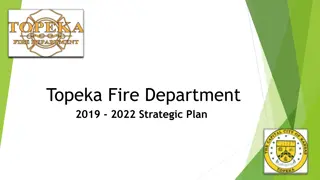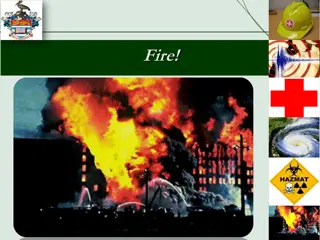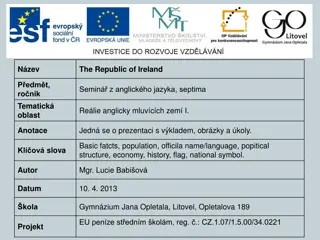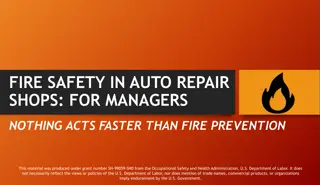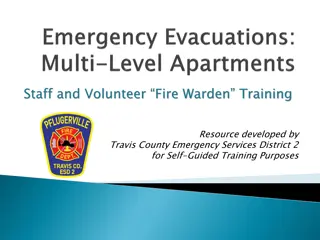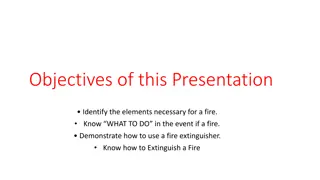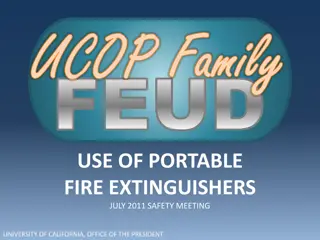Strategic Overview of the Fire Service in Ireland by John McCarthy - May 2022
Strategic overview of the Fire Service in Ireland presented by John McCarthy, discussing ongoing work, recent challenges, and future development. Emphasis on collaborative approaches, local authority fire services, national consistency, and high safety standards.
Download Presentation

Please find below an Image/Link to download the presentation.
The content on the website is provided AS IS for your information and personal use only. It may not be sold, licensed, or shared on other websites without obtaining consent from the author.If you encounter any issues during the download, it is possible that the publisher has removed the file from their server.
You are allowed to download the files provided on this website for personal or commercial use, subject to the condition that they are used lawfully. All files are the property of their respective owners.
The content on the website is provided AS IS for your information and personal use only. It may not be sold, licensed, or shared on other websites without obtaining consent from the author.
E N D
Presentation Transcript
Strategic Overview of the Strategic Overview of the Fire Service in Ireland Fire Service in Ireland John McCarthy (Chair NDFEM Management Board) May 2022
Objective today Objective today Summary of ongoing work Overview recent challenges Discuss future development and direction
Fire Service Context Humanitarian Values Public Trust Teamwork & Mutual Interdependence Community Centred Professionalism Health Safety & Welfare Quality Delivery Dynamic & Responsive Service
A COLLABORATIVE APPROACH TO WORKING A COLLABORATIVE APPROACH TO WORKING Collaboration between national and local is key to successful approach Structures, systems, experience and trust in place for national and local to work together successfully Local Authority Fire Officers contribute greatly to national roles - developing guidance, delivering training courses Secondments to NDFEM from local authorities a cornerstone of development Task and Finish Groups develop; Board Sub-Committees refine; rigorous Management Board approval process FSNOIG - Engagement on HR/IR National Liaison Group National Funding underpinning local authority severe weather/ flooding response NDFEM Board providing a structure for collaborative leadership with strategic direction National Consistency Local Delivery remains the central objective
LOCAL AUTHORITY FIRE SERVICES LOCAL AUTHORITY FIRE SERVICES 31 Fire Authorities under Fire Services Act, 1981 & 2003 27 Fire Services Response Fire Safety (Statutory & Community/ Promotion) Emergency Management Basket of Services Building Control; Civil Defence 218 Fire Stations Full-time; Mixed & Retained Staffing Officers 27 Chief Fire Officers 200 SFOs RSFOs; specialist fire safety; manage service; training; EM 268m Revenue Expenditure Three-year average of 4.3 deaths per million of population, is a third of what it was nearly 20 years ago when it stood at 12.9 deaths per million. This positions Ireland in a league of countries with the lowest rates of fire fatality.
Challenges in last 12 months Challenges in last 12 months Omicron Staff availability/ Business Continuity Rapid co-ordinated Response Strategic Implementation Group Collaborative Approach Response to Storms (January 2022) Virtual co-ordination emerged from Covid working arrangements, scalable and effective with hybrid model to be used to co-ordinate future responses Ukraine Conflict NDFEM and Fire Service staff deployed through EU Civil Protection Mechanism NDFEM co-ordinating humanitarian aid NDFEM working within Housing Task Force NDFEM & Fire Service has demonstrated resilience and very high levels of commitment to public service
Developments in Fire Safety Developments in Fire Safety Pivot towards prevention in all aspects of NDFEM s Work Identifying Risk Vulnerability Keeping pace with changing landscape Community Fire Safety continues to be a key objective for NDFEM Research (working with Health Research Board) Evidence Based Strategy Strengthening Fire Safety in NDFEM Grenfell Fire Safety Sub-Committee
Fire safety Fire safety Grenfell Tower fire June, 2017 Fire Safety Task Force established Broad brief - range of stakeholders Task Force report May, 2018 Extensive recommendations addressed mainly to fire services, NDFEM Minister accepted report and recommendations, and mandated the Management Board of the National Directorate to implement the recommendations within the Department s remit
Fire safety Fire safety Management Board established Fire Safety Sub-Committee Programme of work to address recommendations Work under way on all recommendations with NDFEM Board setting priorities and monitoring progress Working closely with Building Standards Department Task Force established co-ordinate work on accommodation for Ukraine refugees
Fire safety Fire safety Recent progress progress Assessment of cladding installations on medium-to-high rise buildings ongoing through fire services of 178 building fire safety assessments, 12 buildings identified, requiring further action to cladding works completed in 9 cases Recent Code of Practice for Fire Safety Assessment of Premises and Buildings published 1-3-2022 Guide for provision of training to Directors of Owners Management Companies issued to fire services 21-3- 2022 Guide for section 18(2) duties issued for public consultation 8-3-2022 Report on senior officer competency & development circulated
Operations Operations Operation Committee Retained Fire Services - Review Continued Development of Standard Operational Guidance National Training Programme and developing Guidance
Retained Review Retained Review Terms of reference agreed by NDFEM Management Board May 2021 Data collection and online surveys (Coyne Research) on the retained service, with focus on recruitment and retention for the following: Survey of Authorities (NDFEM - Oct 21) Fire Service Management Survey (Nov 21) 90 respsonses Retained Firefighters (Dec 21) 934 responses Reviewing and engaging with key stakeholders i.e. LGMA, Staff Interest Groups i.e. FSNOIG (Retained), CFOA Plan to report to the NDFEM Management Board in September 2022 Implementation process from fourth quarter 2022
Standard Operational Guidance Standard Operational Guidance Total of 57 issued to date (including updated) Confined Space suite of SOGs including training guidance issued in January 2022 Final tranche of SOGs for consideration include: Working with helicopters Electric Vehicles (Alternative Power) Working at Heights/Rescues from Heights Entrapment
Training & Guidance Training & Guidance Central Training Programme - change to new modules in 2021/22 (all one-week). Includes Managing Incidents, Trainer development and fire service management. Focus on core competency areas. 19 courses and 6 seminars/workshops on the central programme in 2022 NDFEM ongoing support/coordination with LASNTG for the QQI Modules (5 in total) for initial firefighter training (retained services). Currently over 50 such courses planned in 2022. Work is prioritised in the following areas for guidance in 2022: Support Document Fire Service Training Use of Breathing Apparatus in the Fire Service National Incident Command System
Emergency Management Emergency Management Lead Government Department Co-ordination of a response to Flooding, Severe Weather, Fire, Landslides, Building Collapse and Hazardous Material emergencies EU Civil Protection NDFEM represent Ireland at Council Working Party (Prociv) and Commission (CPC) Co-ordination of Humanitarian Assistance Chair National Steering Group - Co-ordination among Principal Response Agencies Represent DHLGH at Government Task Force on Emergency Planning
EU Civil Protection EU Civil Protection Developing function Developing function EU CP is an evolving role with a very significant increase in mandate and funding of the EU Civil Protection Mechanism Fire Services has made significant contribution to EU CP with deployment of staff to emergencies and hosting of Civil Protection Training Courses It is intended to activate work on review of MEM Framework under NSG later this year Flooding Guide and Protocol were recently reviewed aiming to complete a review of risk assessment methodology and work with NSG members on other work areas
CAPITAL PROGRAMME AND 2022 BUDGETS CAPITAL PROGRAMME AND 2022 BUDGETS Capital Programme supports fire stations, appliance fleet and equipment, communications & training facilities 2021 2025 Programme announced in Dec 2020 @ 12.5m pa Additional funding being sought through NDP for large scale projects Securing and recoupment to local authorities of 90m unbudgeted expenditure on severe weather/ flooding response 2.7 m revenue budget pays for Central Training Programme, Fire Safety Promotion, secondees
National Command and Control Platform National Command and Control Platform Objective any call can be answered in any Regional Communication Centre Improved Resilience, Management Information and support Single governance structure based largely on tried and trusted approach in 3 Regional Centres WRCC Ctr ERCC MRCC
Current Current National Radio Communications Platform Complete, developing next gen systems National Station Mobilising Equipment Complete National IP Network Complete, developing enhancements National Command and Control Platform Munster Complete West projected July/Aug 2022 East Projected Nov/Dec 2022 Complete Next Generation National Communications Network MRCC Complete WRCC Projected July/Aug 22 ERCC Projected Nov/Dec 22 National Command &Control Platform National Station Mobilising Equipment Complete Complete Next Generation National IP Network
Next Phase Next Phase Smartphone App Dynamic incident information In pilot, preparing deployment Fireground Comms At Incident Communications to a common national standard National procurement DFB Contracting Authority Common National Standard for Fireground Comms Station Portal Dynamic Incident Access at Station, Fire Reporting, Rostering Next Phase development Mobile Data Platform Next Phase development Functionality Review underway
Strategic Direction Safety A Unified Risk Model Management System Emergency Management Planning Pre-Incident planning Detailing Model ARC - Risk Management Aligning Work Streams Supporting with ICT (data integration) Measuring outcomes External Validation Process Area Risk Categorisation Operational Planning Statuary Fire Safety Planning Community Fire Safety Programme Training Programme
CONCLUSION CONCLUSION Fire Service in Ireland have demonstrated high levels of professionalism, resilience and agility NDFEM Management Board oversee both policy development and implementation working with Fire Services Systemic risk management underpins an evidence based approach to all aspects of NDFEM Board s mandate The response to recent challenges affirm the structure and working arrangements we need hold with what s working well New challenges emerging with increasing levels of complexity requiring sometimes challenging and difficult change this needs to be managed NDFEM recognised as cohesive and innovative structure delivering on its mandate



